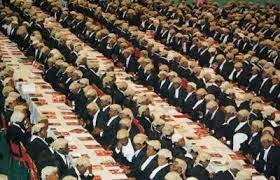
Emmanuel Ohiri – Money Judgment;Unclogging the wheel of Justice

Introduction
The
legal mantra, “a winning party has a right to enjoy the fruit of his judgment”
has been greatly abused in Nigeria. Justice delayed is justice denied even
though litigation under the Nigerian judicial system is more often than not
protracted. Once a claimant initiates an action, it is reasonable for him to
expect that the match will result in a penalty shootout after warming up,
playing till full time and extra time. This is largely due to the various
administrative hurdles, professional antics and unscrupulous practices, which
plagues the administration of justice system in Nigeria (a huge topic for another day).
legal mantra, “a winning party has a right to enjoy the fruit of his judgment”
has been greatly abused in Nigeria. Justice delayed is justice denied even
though litigation under the Nigerian judicial system is more often than not
protracted. Once a claimant initiates an action, it is reasonable for him to
expect that the match will result in a penalty shootout after warming up,
playing till full time and extra time. This is largely due to the various
administrative hurdles, professional antics and unscrupulous practices, which
plagues the administration of justice system in Nigeria (a huge topic for another day).
A
tool usually deployed by legal Practitioners to choke the delivery of justice
and ensure the triumphant party merely obtains a Pyrrhic victory is by
obtaining an order for stay of execution. This order prevents the successful
party (Judgment Creditor) from being rewarded by the losing party (Judgment
Debtor). Whilst the rules of court provide for various ways of enforcing
judgments, the defeatist attitude of litigants in Nigeria and sadly as well as
their solicitors, lead to frivolous applications for stay of execution before
the ink is dry on the judgment. [I may have prepared one or more of such applications
in my experience ;-)]. For fear of being chastised by the Court of Appeal (in the case of trial courts),
and under the guise of preserving the “Res”, Nigerian courts have cultivated
the habit of granting applications for stay of execution of judgments it has
toiled over the years to deliver. In my opinion, these courts usually fail to
consider the circumstances of each case and or the weight of evidence adduced
by the Applicants before granting such orders. This is unjust especially in the
case of money judgments.
tool usually deployed by legal Practitioners to choke the delivery of justice
and ensure the triumphant party merely obtains a Pyrrhic victory is by
obtaining an order for stay of execution. This order prevents the successful
party (Judgment Creditor) from being rewarded by the losing party (Judgment
Debtor). Whilst the rules of court provide for various ways of enforcing
judgments, the defeatist attitude of litigants in Nigeria and sadly as well as
their solicitors, lead to frivolous applications for stay of execution before
the ink is dry on the judgment. [I may have prepared one or more of such applications
in my experience ;-)]. For fear of being chastised by the Court of Appeal (in the case of trial courts),
and under the guise of preserving the “Res”, Nigerian courts have cultivated
the habit of granting applications for stay of execution of judgments it has
toiled over the years to deliver. In my opinion, these courts usually fail to
consider the circumstances of each case and or the weight of evidence adduced
by the Applicants before granting such orders. This is unjust especially in the
case of money judgments.
Stay of Execution of a Money Judgment
A
Judgment Creditor is entitled to reap the benefits of a judgment delivered in
his favour until the same is set aside. Nevertheless, an unsuccessful litigant
may apply for stay of execution but he must show substantial reasons for
wanting to deprive the successful party of the fruits of his judgment. There
are however exceptional and special circumstances that may warrant the
deprivation of a successful party of the fruits of his money judgment. These
circumstances are entirely at the discretion of the court. The court is
required to consider the equal right to justice of both parties. The Supreme
Court’s decision in U.B.N
Ltd v Odusote Bookstore Ltd may shed some light on this point,
as the court held: A
discretion that is based (sic) in favour of an appellant for stay but does not
adequately take into account the respondent’s right to justice is a discretion
that has not been judicially exercised”.[1]
Judgment Creditor is entitled to reap the benefits of a judgment delivered in
his favour until the same is set aside. Nevertheless, an unsuccessful litigant
may apply for stay of execution but he must show substantial reasons for
wanting to deprive the successful party of the fruits of his judgment. There
are however exceptional and special circumstances that may warrant the
deprivation of a successful party of the fruits of his money judgment. These
circumstances are entirely at the discretion of the court. The court is
required to consider the equal right to justice of both parties. The Supreme
Court’s decision in U.B.N
Ltd v Odusote Bookstore Ltd may shed some light on this point,
as the court held: A
discretion that is based (sic) in favour of an appellant for stay but does not
adequately take into account the respondent’s right to justice is a discretion
that has not been judicially exercised”.[1]
In
considering the parties’ equal right to justice, the law stipulates that one of
the circumstance where a Judgment Debtor should be allowed to retain the
judgment debt pending appeal, is where there is a pending valid appeal before
the superior court and the Judgment Creditor consents to such an arrangement.
See U.B.N Ltd’s case
referred to above. Consequently, where an appeal has not been entered at the
superior court and the Judgment Creditor has not consented to the Applicant
retaining the judgment sum, the court has no power to permit the Applicant to
hold the same.
considering the parties’ equal right to justice, the law stipulates that one of
the circumstance where a Judgment Debtor should be allowed to retain the
judgment debt pending appeal, is where there is a pending valid appeal before
the superior court and the Judgment Creditor consents to such an arrangement.
See U.B.N Ltd’s case
referred to above. Consequently, where an appeal has not been entered at the
superior court and the Judgment Creditor has not consented to the Applicant
retaining the judgment sum, the court has no power to permit the Applicant to
hold the same.
Responsibility of the Court
As
an application for stay of execution is an exercise of the equitable powers of
the court, an Applicant for a stay of execution of a money judgment must
approach the court with clean hands by exhibiting in its affidavit, its last
audited annual statement of account to provide the court with full and frank
knowledge of its financial position. The court has held that in the case of a
company, the law enjoins it to prepare an audited annual statement of account showing
its assets, which will include its reserve (if any) and liabilities. Where it
fails to do so either through neglect to disclose relevant facts or suppression
of them, it has not shown readiness for fairness and equity[2].
an application for stay of execution is an exercise of the equitable powers of
the court, an Applicant for a stay of execution of a money judgment must
approach the court with clean hands by exhibiting in its affidavit, its last
audited annual statement of account to provide the court with full and frank
knowledge of its financial position. The court has held that in the case of a
company, the law enjoins it to prepare an audited annual statement of account showing
its assets, which will include its reserve (if any) and liabilities. Where it
fails to do so either through neglect to disclose relevant facts or suppression
of them, it has not shown readiness for fairness and equity[2].
This
means that the equitable powers of the court may only be invoked where the
Applicant had provided the court with detailed proof (in its affidavit) of its
assets and liabilities. This requirement is more critical where the Applicant
has either claimed poverty or opulence as the basis for grant of stay of
execution. The requirement formed the basis of the decision of the Court of
Appeal in Chukwu v.
Onyia[3], where the Court of Appeal per Uwaifo JCA held as
follows: “That is the only
way the court can best exercise its discretion to grant or refuse the stay.
Bare assertions of poverty or opulence by him do not assist, afortiori when the
facts are suppressed or misrepresented by him. Arguments based on them make a
ritual of the principles and in effect invite the court to exercise its
discretion on nothing other than those principles, or indeed on false facts,
instead of upon true and full facts guided by the principles. This does
incalculable harm to the course of justice.”(Underlining ours)
means that the equitable powers of the court may only be invoked where the
Applicant had provided the court with detailed proof (in its affidavit) of its
assets and liabilities. This requirement is more critical where the Applicant
has either claimed poverty or opulence as the basis for grant of stay of
execution. The requirement formed the basis of the decision of the Court of
Appeal in Chukwu v.
Onyia[3], where the Court of Appeal per Uwaifo JCA held as
follows: “That is the only
way the court can best exercise its discretion to grant or refuse the stay.
Bare assertions of poverty or opulence by him do not assist, afortiori when the
facts are suppressed or misrepresented by him. Arguments based on them make a
ritual of the principles and in effect invite the court to exercise its
discretion on nothing other than those principles, or indeed on false facts,
instead of upon true and full facts guided by the principles. This does
incalculable harm to the course of justice.”(Underlining ours)
Conclusion
It
is important that the court should refuse to grant applications for stay of
execution of a money judgment where Applicants fail to exhibit their financial
statement or a breakdown of their assets and liabilities towards enabling the
court invoke its equitable powers. A Judgment Creditor should not be denied the
fruit of his judgment on insubstantial grounds or lack thereof in the
Applicant’s affidavit. At the very least, the court should invoke its power to
order the payment of the judgment debt to the Chief Registrar of the court, who
shall in turn deposit the same into an interest yielding deposit account in a
reputable commercial bank pending the determination of the appeal[4].
is important that the court should refuse to grant applications for stay of
execution of a money judgment where Applicants fail to exhibit their financial
statement or a breakdown of their assets and liabilities towards enabling the
court invoke its equitable powers. A Judgment Creditor should not be denied the
fruit of his judgment on insubstantial grounds or lack thereof in the
Applicant’s affidavit. At the very least, the court should invoke its power to
order the payment of the judgment debt to the Chief Registrar of the court, who
shall in turn deposit the same into an interest yielding deposit account in a
reputable commercial bank pending the determination of the appeal[4].
[1]
(1994) 3 NWLR (Pt 331) 129 at 150 – 151
(1994) 3 NWLR (Pt 331) 129 at 150 – 151
[2]
Guinea Insurance Plc. v. Monarch Holdings Ltd. (1996) 3 NWLR pt. 436 p.365 @371
G-H
Guinea Insurance Plc. v. Monarch Holdings Ltd. (1996) 3 NWLR pt. 436 p.365 @371
G-H
[3]
(1990) 2 NWLR pt.130 p.80 @84-85 H-B
(1990) 2 NWLR pt.130 p.80 @84-85 H-B
[4]
Kwarapoly vs. Oyebamiji (2008) 3 NWLR (part 1075) page 459, Kopek Construction
Ltd vs. Ekisola (1998) 10 NWLR (part 568) page 120.
Kwarapoly vs. Oyebamiji (2008) 3 NWLR (part 1075) page 459, Kopek Construction
Ltd vs. Ekisola (1998) 10 NWLR (part 568) page 120.

Emmanuel Ohiri
TNP
Emmanuel Ohiri is a vibrant and dynamic young lawyer with a high level
of intellectual curiosity, passion for perfection and tactical
proficiency.
Ed’s
Note – This article was originally posted here.
Note – This article was originally posted here.



